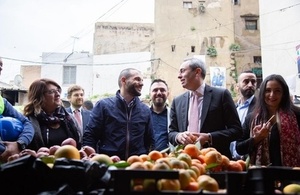Rampling visits North Lebanon and Tripoli
On his first official visit to Lebanon and Tripoli, British Ambassador to Lebanon Chris Rampling held a series of meetings and saw UK-funded projects.

Ambassador Rampling in the Souks of Tripoli visiting a UK supported project
Ambassador Chris Rampling held a series of meetings with the Head of the Municipality Ahmad Kamareddine, the Mufti of Tripoli Dr. Malek El Shaar, representatives from Tripoli’s Chamber of Commerce, and toured local UK-funded projects benefiting residents of Tripoli.
He visited the historical Souks of Tripoli to see how the second phase of rehabilitation project for around 60 shops is progressing. This is part of an additional £800,000 to help renovate and create jobs through the Lebanon Host Communities Support Programme (LHSP). Rampling also met with young people from the cultural café on Syria Street, and talked with MARCH about peace building, coexistence and their forward looks for the future. At the Mouvement Sociale centre, Ambassador Rampling saw how vulnerable young people are benefiting from the learning opportunities provided through DFID’s No Lost Generation Programme.
He also attended the signing of a Memorandum of Understanding between the British Council, the Chamber of Commerce, the municipality and the Lebanese International University, represented by Director David Knox, Toufic Dabbousi, Ahmad Kamareddine and Dr Ahmad Al Ahdab respectively.
Since 2011, the UK has committed over £730 million to supporting Lebanon’s stability and prosperity. By March 2019 we will have reached over 1,440,000 people and more than 220 municipalities under the Lebanon Host Communities Support programme (LHSP) in cooperation with the Ministry of Social Affairs and UNDP. DFID has committed an additional £5 million on this programme in 2018/19. Since 2016, DFID support has enabled almost 64,000 boys and girls to benefit from non-formal education to and supported over 116,000 disadvantaged boys, girls and women in Lebanon who are vulnerable to abuse with a package of services to help them deal with trauma and prevent abuse in the future.
At the end of his visit, Ambassador Rampling said:
I am really privileged to be visiting Tripoli today, a city of much historical and geographical importance for Lebanon and the region. I listened to Tripoli officials and religious heads about the challenges and opportunities lying ahead.
I am excited to announce from Tripoli that next week London will be the venue for the Lebanon-UK Business and Investment Forum, led by PM Hariri. Trade will be at the heart of our growing relationship. With the total bilateral trade standing at £586m in quarter two of 2018 – it is a clear sign that we are heading in the right direction.
What was started last year is continuing this year with UK aid investing over £1.2 million to renovate the old Souks of Tripoli, a project that will play an important role in the city’s economic development. We believe that investments in infrastructure benefits Lebanese citizens and supports future economic growth. That is why we committed £40 million of UK support to the Lebanese economy during the CEDRE conference, and supports the ambitious programme the Government set out there.
Through our No Lost Generation Programme, we’re providing £65 million to deliver quality non-formal education and child protection services to the most vulnerable out of school children and young people in Lebanon. Today I saw a good example of how this is done at Movement Sociale. And I was pleased to meet with young people from Syria street who have put their differences behind them, for the sake of their communities and their city.
The relationship between our two countries has never been stronger and we remain a firm supporter of Lebanon’s security, prosperity and stability.